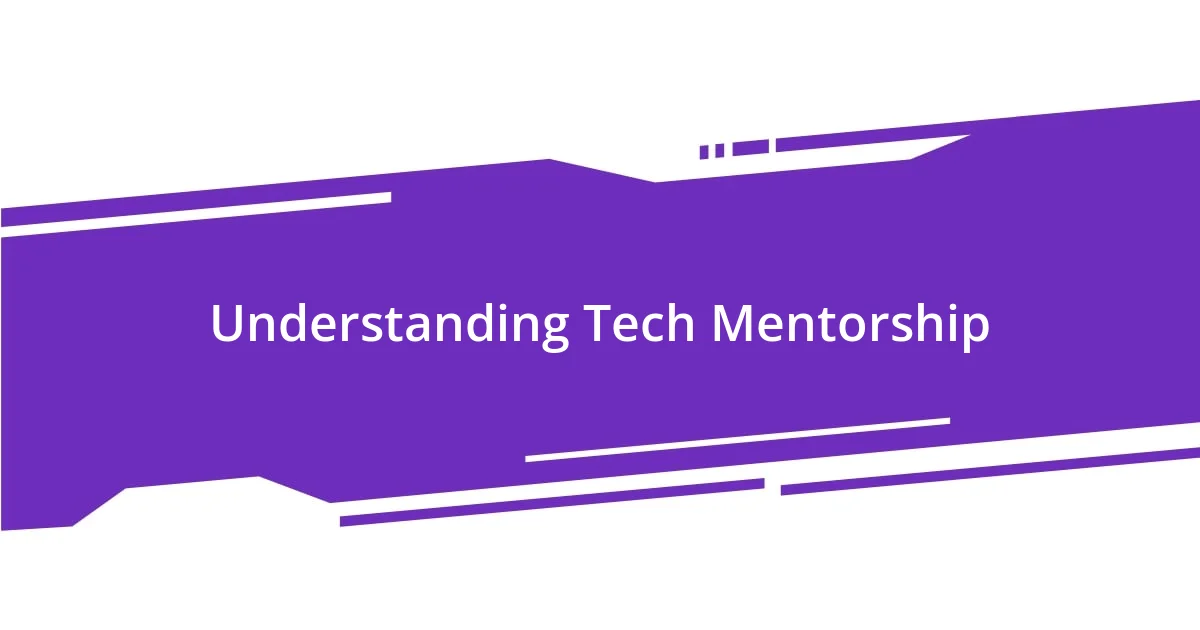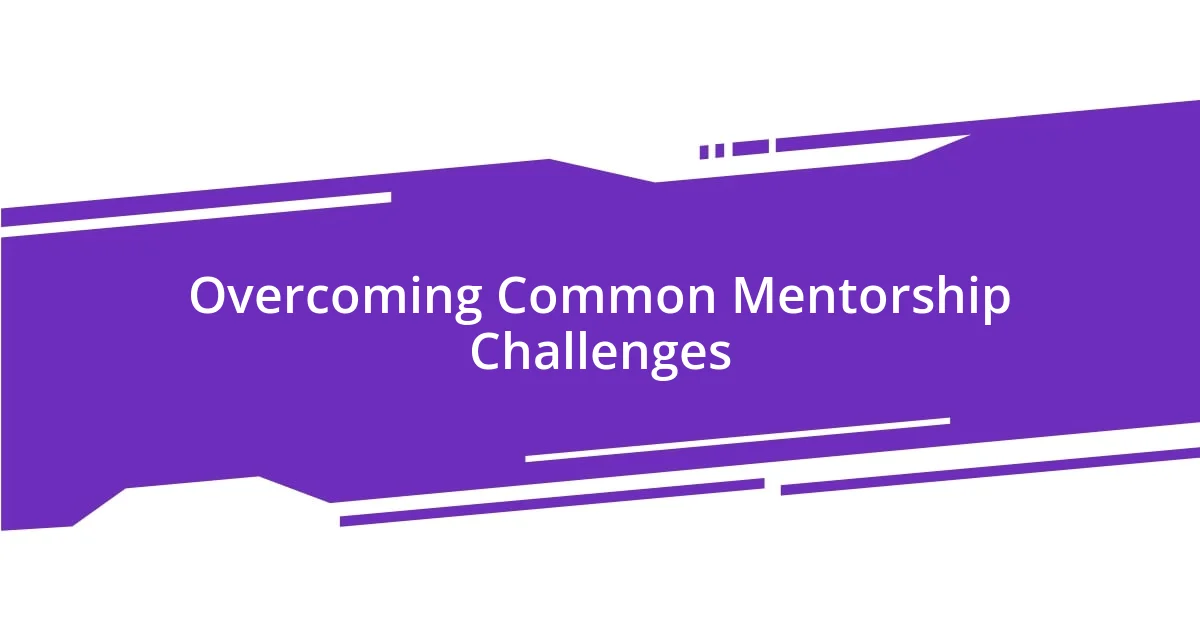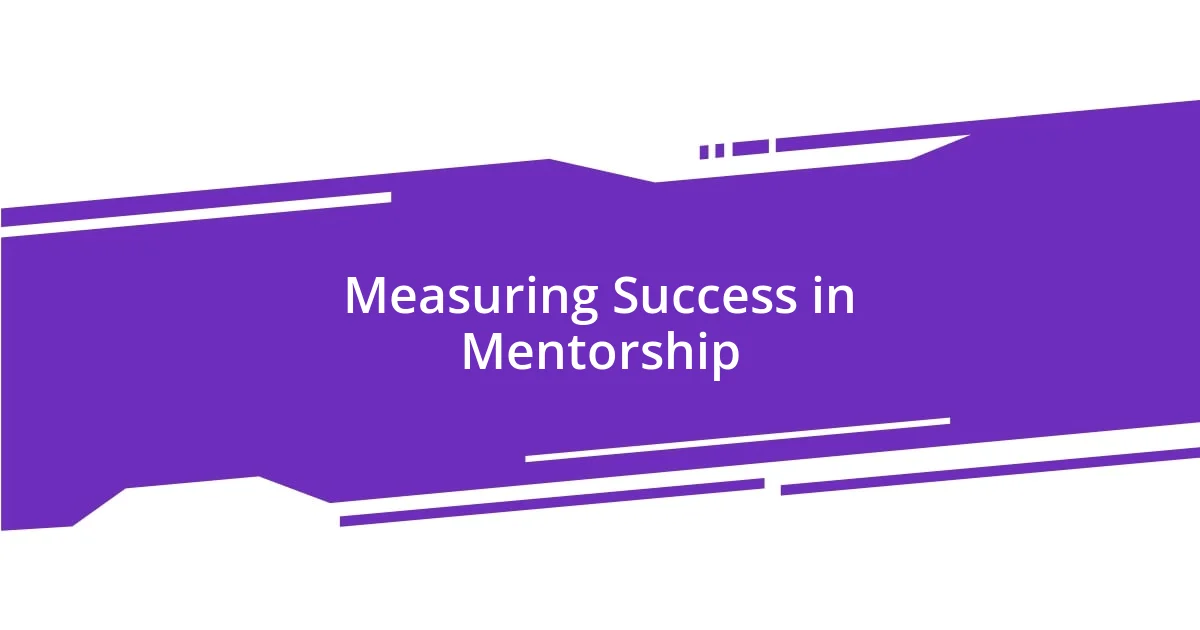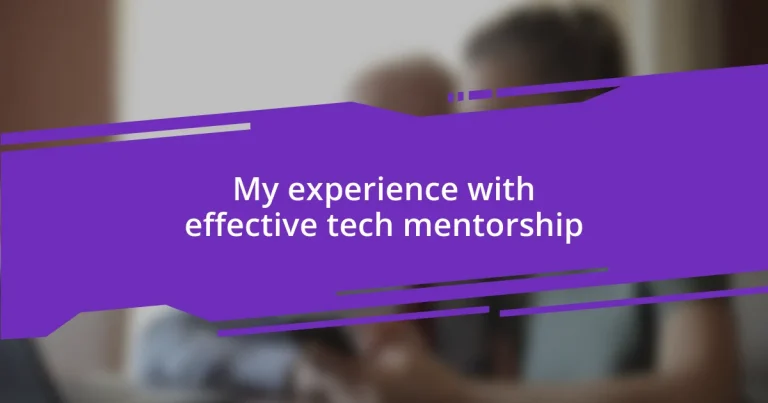Key takeaways:
- Effective tech mentorship fosters growth through empathy, open communication, and a safe environment for sharing challenges and uncertainties.
- Building a strong mentor-mentee relationship involves trust, flexibility, and the ability to set clear, collaborative goals that adapt to changing needs.
- Success in mentorship is measured not only by skill acquisition but also by the quality of the relationship and the progress made over time through constructive feedback.

Understanding Tech Mentorship
Tech mentorship is more than just sharing knowledge; it’s about fostering growth and confidence in a complex landscape. I remember my early days in tech, feeling overwhelmed by the pace of innovation and the vastness of information. I had a mentor who not only guided me through technical skills but also encouraged me to embrace failure as a learning opportunity. Isn’t it fascinating how a little encouragement can make such a difference in someone’s journey?
When I think about effective tech mentorship, I realize it thrives on a relationship built on trust and open communication. This connection allows mentees to share their challenges without fear of judgment. During a particularly tough project, my mentor offered a safe space to discuss my frustrations. That supportive dialogue made me rethink my approach and ultimately led to a successful outcome. Have you ever felt that sense of relief when someone truly understands your struggles?
Moreover, tech mentorship should adapt to the evolving needs of the mentee. I once had a mentor who was incredibly flexible, adjusting our sessions based on my unique learning style. This personalization made me feel valued, and it significantly boosted my engagement. How often do we find ourselves in learning environments that don’t cater to our individual needs? It’s a reminder that tailored guidance not only aids in skill acquisition but also inspires lifelong learning.

My Mentorship Journey Overview
Growing up in the tech world, my mentorship journey has always been a vital component of my growth. I recall a significant moment during my first hackathon. I felt lost amid experienced tech enthusiasts. My mentor’s presence was a game changer; he encouraged me to dive in and tackle the challenges, providing insights that helped me grasp complex ideas quickly. That supportive push not only boosted my confidence but also ignited my passion for coding.
As I reflect on my mentorship experiences, I realize they were not just about imparting knowledge but also about cultivating an environment where I felt safe to express my uncertainties. I found mentors who took the time to listen to me — those moments when they validated my feelings were invaluable. I remember a session where I shared my fears about not living up to expectations, and the mentor responded with his own stories of trial and error. That connection helped me see that vulnerability can be a strength.
Looking back, I appreciate how each mentor I encountered brought a unique perspective to my journey. One mentor, who specialized in UX design, challenged me to think creatively and user-centered. I found this approach refreshing, as it opened my eyes to the importance of empathy in technology. Each of these relationships has shaped my professional identity, reminding me of the varied paths we can take in our careers.
| Mentorship Aspect | My Experience |
|---|---|
| Encouragement | My confidence soared during my first hackathon when my mentor believed in my ability to tackle challenges. |
| Safe Space | Expressing uncertainties became easier when my mentor shared his own experiences, making me feel understood. |
| Unique Perspectives | A UX design mentor encouraged me to integrate empathy into my work, transforming how I approach tech projects. |

Key Qualities of Effective Mentors
Effective mentors possess several key qualities that can significantly shape a mentee’s journey. For me, one of the most impactful traits is empathy. I distinctly remember discussing a challenging coding project with a mentor who truly took the time to understand my frustrations. His ability to relate to my struggles not only made our conversations more meaningful but also encouraged me to explore solutions confidently. It’s amazing how feeling understood can lift such a heavy weight off your shoulders.
The following qualities stand out as essential for effective mentors:
- Empathy: Understanding the mentee’s feelings and challenges.
- Patience: Taking the time to clarify doubts and allowing space for learning.
- Flexibility: Adapting teaching methods to suit the mentee’s learning style.
- Listening Skills: Actively listening to concerns and feedback, creating a dialogue.
- Trustworthiness: Maintaining confidentiality and building a safe environment.
Another quality that I found invaluable is genuine enthusiasm for the field. I once had a mentor whose passion for technology was contagious. During our chats, his excitement about new trends ignited my own interest. It made me eager to learn and explore beyond my comfort zone. When mentors share their enthusiasm, it can inspire mentees to push boundaries and embrace growth. How empowering it feels to be buoyed by someone’s genuine excitement!

Building a Productive Relationship
Building a productive relationship with my mentors has always felt like a dance of mutual understanding. I remember an early meeting with a mentor where we spent the first half just getting to know each other. We chatted about our backgrounds, interests, and visions for the future. This icebreaker not only set a comfortable tone but also allowed us to align our expectations and goals, forging a stronger bond right from the start.
Trust is another crucial ingredient in any mentorship. I vividly recall a moment when I hesitated to share a project I was struggling with. I finally mustered the courage to show my mentor my less-than-perfect work, and instead of criticism, I received encouragement and constructive feedback. That experience reinforced my belief that vulnerability can foster deeper connections, enabling me to be more open in our future discussions. Isn’t it amazing how a single moment of trust can completely transform the dynamics of a relationship?
The importance of adaptability in these relationships cannot be overstated. There was a time when a mentor of mine used to switch between technical discussions and personal anecdotes seamlessly. One particular story about overcoming a major setback stuck with me—it illustrated that failure is part of the journey. His ability to read my reactions and adjust his approach enriched our conversations and kept me engaged. How valuable is it to work with someone who truly tailors their guidance to fit your needs?

Setting Clear Goals Together
Setting clear goals together is a pivotal aspect of effective mentorship. I remember a particular session where my mentor and I sat down to craft a precise roadmap for my learning journey. We broke down my long-term aspirations into smaller, actionable steps, creating a sense of direction that transformed my approach to learning. Have you ever felt lost without a clear goal? That clarity made all the difference for me.
During this goal-setting discussion, my mentor encouraged me to voice my own aspirations openly. I was surprised to learn how much my mentor valued my input and perspective. We collaborated on a mix of technical skills I wanted to acquire and personal development milestones, creating a balanced framework that I found motivating. How refreshing it is to feel like an equal partner in the process!
As we revisited our goals over subsequent meetings, I learned that flexibility is just as important as setting those initial targets. There were moments when I felt overwhelmed and needed to adjust our timeline. Instead of seeing this as a setback, my mentor welcomed the chance to recalibrate our goals, patiently guiding me through the difficulties. This adaptability not only kept me focused but also instilled a sense of accountability in me that I found immensely rewarding. Isn’t it incredible to work with someone who adjusts their sails along with yours?

Overcoming Common Mentorship Challenges
Navigating mentorship can sometimes feel like walking a tightrope, especially when miscommunication arises. I recall a time when I misinterpreted my mentor’s feedback as criticism. Initially, I felt deflated, but I took a step back and realized that my mentor’s intent was to challenge me, not to belittle my work. This incident taught me the value of clarifying intentions during conversations—isn’t it crucial to ensure everyone is on the same page?
Another hurdle I’ve encountered is managing diverse expectations. There was a phase when my mentor had a different vision for my career path than I did, which created some friction. I remember feeling frustrated but decided to have an honest conversation about my aspirations. Once we laid everything on the table, we found a way to merge our ideas into a cohesive plan. This experience showed me that open dialogue can transform conflict into collaboration. Have you ever experienced a moment when transparency turned a challenging situation into a fruitful discussion?
Time constraints can also be a significant challenge in mentorship. I’ve had sessions where we rushed through discussions due to our busy schedules, leaving me with unanswered questions and lingering confusion. To address this, I suggested implementing a brief check-in process before each meeting to prioritize our objectives. This simple adjustment not only set the tone for more productive sessions but also allowed us to maximize our limited time together. Isn’t it comforting to know that a little planning can lead to more impactful conversations?

Measuring Success in Mentorship
Measuring success in mentorship isn’t solely about reaching the finish line—it’s about recognizing the progress made along the way. I recall a moment when my mentor and I sat down to evaluate my growth. We used a simple but effective framework to assess both the technical skills I’d acquired and the confidence I’d gained in applying them. It was eye-opening to see how far I had come, reminding me that every small win counts. Have you ever taken the time to look back and appreciate your achievements?
Feedback is another critical component for assessing mentorship success. Early in my journey, I remember feeling a bit anxious about seeking my mentor’s opinion on my projects. However, once I started actively requesting feedback and embarking on discussions about areas for improvement, I noticed a shift in my growth. It empowered me to see constructive critiques as valuable insights rather than discouragements. Isn’t it fascinating how an open dialogue can reshape your perception of growth?
Lastly, I’ve learned that success in mentorship is also felt in the relationship cultivated over time. There was a moment when a small casual chat turned into a deep discussion about our shared challenges in the tech industry. That exchange not only strengthened our bond but also highlighted the importance of trust and mutual respect in the mentoring process. I realized that a strong rapport yields a more enriching experience. Have you ever found that the connections you build are just as significant as the skills you develop?














